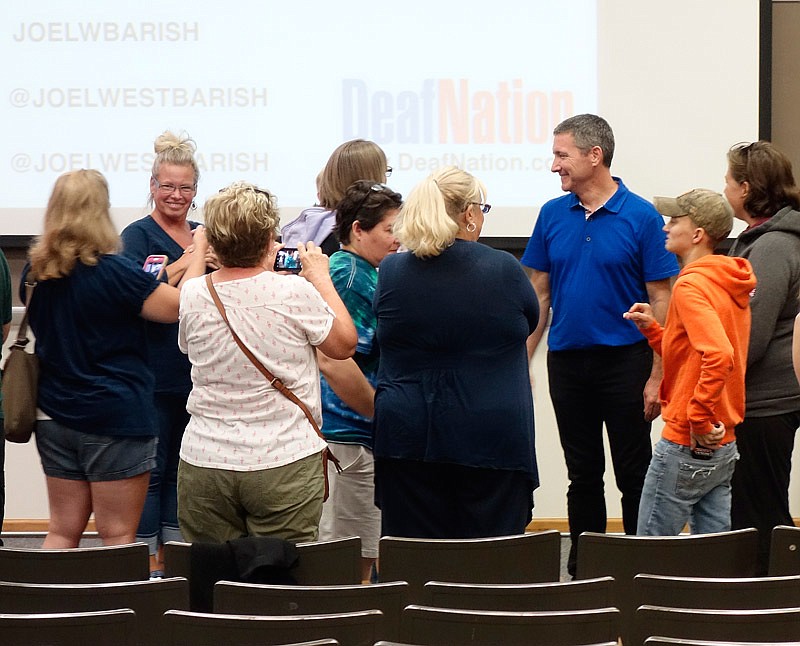Joel Barish, founder of DeafNation, brought his sense of purpose and stories of exotic countries to an event Thursday evening at William Woods University.
Lucille Blackwell, an English and drama teacher at the Missouri School for the Deaf, introduced Barish.
"I have to admit I am now a big fan of Joel Barish," she told the gathering using sign language. "We watched some of his videos and did some research with them, and my students and I decided we liked Joel."
She helped bring him to the college for Deaf Awareness Week. The university has a strong interpreter and American Sign Language studies program, ranked among the top in the country.
Barish, who is deaf, said his parents and brother are also deaf. He loves adventure, has travelled to 85 countries, and has the pictures to prove it.
"I like climbing to extreme heights seeking exotic adventures, no matter how unknown," he said.
When he goes on location, he likes to wear the native garb, eat the native food and stay with local families. Above all, he is seeking out deaf people and will travel hours and days to find them. Once found, he videotapes their encounter and turns the film and interviews into documentaries (visit deafnation.com or joelbarhish.com to view).
"Traveling around the world the last 20 years, I never did one negative story," he said. "My focus is on how deaf people live a happy life. I think everyone has a responsibility to let negativity go. I don't think, especially on social media, it goes anywhere."
One thing Barish said he enjoys is introducing deaf people in isolated areas to other deaf people. Some actually think they are the only deaf people anywhere.
"I use my laptop to show deaf people that there are deaf people all over the world," he added.
Some people have developed their own ways of communicating. They don't know international signs, let alone American Sign Language. When he arrives in a country, he seeks out a travel companion to act as his guide and help interpret.
"I want to have a native (guide) to talk about their own experiences and their own daily lives," he said.
Often, Barish finds schools for the deaf and makes friends there. In some places, deaf people are harder to find because their societies have rejected them. Some Amazon tribes, for example, believe children with physical defects have no souls so they bury those children alive.
But there are good stories. In Ethiopia, Barish met a deaf child at her school.
"She said, 'I want to do what you do,'" he said. "Four years later, I got a call and they said she was in university."
Barish has made documentaries at 11,000 feet in Tibet, where he was hospitalized for altitude sickness. In Mongolia, he stayed with a deaf, nomadic family of seven in their yurt (also called a ger).
"They had never met another deaf individual until I arrived," he said.
He traveled to Myanmar, Bali, Sri Lanka and Greenland. He visited an island community in Panama and brought together deaf people in Vietnam.
"I have a huge sense of curiosity," Barish said. "I want to learn how they sign. I want to try to learn their languages."
He films his documentaries, sells advertising for them and gathers sponsors.
"You have to be willing to stay outside your comfort zone," said Barish, who lives in Austin, Texas. "You have to think about what it means to live in a place like that. You have to have your finances in order."
He said it's not an ego trip for him to travel to all these places to make movies. He's trying to go to out-of-the-way places to meet deaf people in developing countries so he can document their lives.
"I've got a long way to go," he said. "It's not an ego thing for me to check off a list. I want to go to places where nobody else has seen the attractions. I want to see where people eat and sleep."
Barish said he travels three or four months out of the year and sometimes stays home to work on projects. More than anything, he wants deaf people to know they are not along, nor are they incapable just because they can't hear.
"I think deaf people can do anything," he said. "We should empower deaf people in their own cultures, in their own ways of life."

